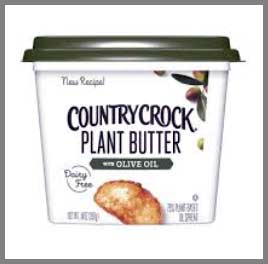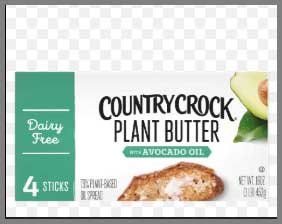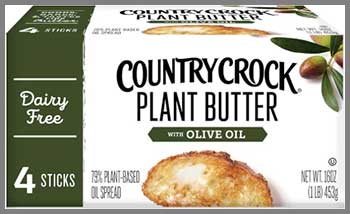If you’re standing in the dairy aisle, completely overwhelmed by the sudden explosion of plant-based butters, I understand. You want the creamy taste and performance of butter for your toast, your pasta, and your baking, but you need (or simply want) to skip the dairy.
If you’re looking for an affordable, incredibly accessible, and surprisingly convincing alternative that performs just like the “real thing” in almost every situation, Country Crock Plant Butter is very likely your answer. It’s the everyday workhorse for the modern, dairy-free, or “flexitarian” kitchen. This review will explore if it’s truly the 1:1 replacement it claims to be.
My Experience With Country Crock Plant Butter

My journey into the world of dairy-free alternatives wasn’t entirely by choice. My partner developed a pretty severe dairy intolerance, and I’ll be honest, butter was the hardest thing for us to replace.
We tried everything. Those early vegan margarines from the 2010s were, frankly, awful.
They were oily, tasted faintly of plastic, and would separate into a weird, watery mess the second they hit a hot pan.
When I first saw Country Crock Plant Butter, I was deeply skeptical.
The brand is synonymous with that classic, soft, old-school margarine tub my grandmother used.
But the packaging—especially the sticks made with avocado oil—looked professional and promising. They were clearly marketing this not just as a “spread” but as “butter.”
The first thing I tried was the tub with olive oil. I opened it, and it looked right. It was a familiar pale yellow, and it was perfectly soft. I used it on a piece of toasted sourdough. The spreadability was an A+. It was instantly soft right out of the fridge, meaning no more torn bread. The taste? It tasted… like Country Crock. And I mean that as a compliment. It was creamy, perfectly salty, and it melted properly into all the nooks and crannies. The olive oil flavor was non-existent, which, for a neutral butter, was a very good thing. It just tasted like a good, reliable spread.
The real test, however, was baking. This is where most dairy-free butters have failed me spectacularly. I grabbed the Avocado Oil sticks, which the brand heavily markets for baking and cooking. I decided to make my grandmother’s classic chocolate chip cookies, a recipe I know by heart and that relies on creaming butter and sugar.
The sticks were a bit softer to the touch than cold dairy butter, so “creaming” them with the sugar was incredibly fast. The dough looked right. The texture was right. I baked them, and they spread just a tiny bit more than they do with dairy butter, but the flavor was spot on. My partner, the one who has to be dairy-free, was ecstatic. I, the regular dairy-eater, genuinely couldn’t tell the difference in the finished cookie.
Since that day, it has become our household staple. I use the Avocado Oil sticks for sautéing vegetables (the smoke point does seem higher, it doesn’t brown and burn as fast as dairy butter) and for all my baking. I use the Olive Oil tub for sandwiches, mashed potatoes, and slathering on toast. It’s not an artisanal, cultured, fancy-pants butter, but it’s not trying to be. It has successfully and affordably replaced our everyday butter for 99% of our needs.
Also read: My Thoughts on Nurri Ultra Filtered Milkshake
Pros Of Country Crock Plant Butter

- Incredible Accessibility And Affordability: This is, for me, the number one pro. You don’t have to go to a specialty health food store or a high-end grocer to find this. It’s in Walmart. It’s in Kroger. It’s in Safeway. It’s right there next to the regular dairy butter, not hidden in some sad “vegan” corner. This mainstream availability is a game-changer. Furthermore, the price is fantastic. It’s often priced competitively with, or even cheaper than, regular store-brand dairy butter. When you compare it to the artisanal, nut-based vegan butters (which can be two or three times the price), Country Crock makes dairy-free living feel less like a “premium” or “luxury” lifestyle and more like an easy, everyday choice.
- Amazing Performance In Baking: I really can’t overstate this. The sticks (specifically the Avocado Oil or Olive Oil sticks) are a triumph of food science. They are formulated to be a true 1:1 replacement for dairy butter in baking, and they deliver. I have used them to make cookies, cakes, quick breads, scones, and frostings, all with excellent results. They cream beautifully with sugar, creating that light, fluffy base you need. Because they have a slightly higher water content and softer texture, I find they produce an exceptionally moist and tender crumb in cakes and a wonderfully chewy texture in cookies. For the 95% of home bakers who are making cookies and cakes (and not laminated croissant dough), this is a perfect, reliable substitute that requires zero guesswork.
- The “Tastes Like Butter” Factor Is High: Let’s be clear: this tastes almost identical to Country Crock Original spread, which is what millions of Americans already think of as a buttery taste. It’s creamy, salty, and rich. Crucially, it lacks the weird, waxy, or “chemical” aftertaste that plagued so many older margarines and even some current vegan butters. It doesn’t taste like coconut. It doesn’t taste like nuts. The “olive oil” or “avocado oil” flavors are completely neutral, not at all overpowering. When you melt it over pasta or popcorn, it delivers that savory, buttery satisfaction you’re looking for. My omnivore friends and family use it without ever noticing it’s plant-based.
- Excellent Spreadability Right From The Fridge: This is a huge quality-of-life victory. The tub version is perfectly soft and spreadable the second you take it out of the refrigerator. There is no waiting for the butter to soften. There is no microwaving it and getting a melted-on-the-outside, hard-on-the-inside brick. There is no more tearing your soft sandwich bread or delicate toast. It just works, every single time. This might seem like a small thing, but on a busy morning, it feels like a genuine luxury.
- Smart Versatility In Varieties: The brand was incredibly smart in how they launched this. They didn’t just make one product and hope for the best. They created two distinct formats: tubs and sticks. The tubs (like the Olive Oil one) are designed for spreading, with a softer, smoother texture. The sticks (like the Avocado Oil one) are formulated to be firmer, with a different fat-to-water ratio specifically for baking and cooking. They also market the Avocado Oil sticks as having a higher smoke point, which I’ve found to be true. It’s great for sautéing onions and garlic without it smoking and burning immediately. This shows they actually thought about how people use butter.
- A Truly Vegan And Allergen-Friendly Option: This product is 100% plant-based, which means it’s not just dairy-free; it’s fully vegan (containing no whey or casein, which are milk derivatives hidden in many margarines). It’s also gluten-free. And, because the main varieties are based on oils like avocado and olive (and not almond or cashew), they are a fantastic, safe option for households dealing with nut allergies. It’s a single product that can cater to guests with vegan, gluten-free, and dairy-free needs all at once.
Cons Of Country Crock Plant Butter
The Drawbacks And Dealbreakers
- The Use Of Palm Oil: This is the biggest and most significant con, and for many people, it’s a dealbreaker. If you turn over the package, you will see the primary ingredients are a “blend of plant-based oils,” which includes palm fruit and/or palm kernel oil. The palm oil industry is a major driver of deforestation, habitat loss (particularly for orangutans), and other significant environmental problems. While Country Crock’s parent company, Upfield, is a member of the Roundtable on Sustainable Palm Oil (RSPO), many environmental advocates argue that this certification is not strict enough. If you are a consumer who actively avoids palm oil for ethical and environmental reasons, this product is not for you.
- It’s Still A Highly Processed Food, Not A “Health” Food: The marketing is very clever. They put “Made with Avocado Oil” or “Made with Olive Oil” in big, green letters on the front. This implies health. It makes you think of a lovely, fresh avocado. But let’s be real: this is not “healthy” in the way that eating an avocado is. It is a highly processed oil blend. The amount of avocado or olive oil is secondary to the main blend of palm and canola oils. It has the same amount of calories as dairy butter (around 100 per tablespoon) and is still very high in fat. It’s lower in saturated fat than dairy butter (a plus!), but it is not a low-fat or low-calorie food. It’s an alternative, not a “diet” product.
- Higher Water Content Can Affect Some Advanced Recipes: While I praised its baking performance for 95% of uses, it’s not a universal magic wand. For very specific, advanced baking, the difference in texture and water content matters. I would not use this to make a traditional French pie crust (pâte brisée) or laminated doughs like croissants or puff pastry. These recipes rely on cold, hard pockets of 100% fat to create steam and lift, resulting in flaky layers. This plant butter is softer and has more water, which would result in a “short” or tender crust rather than a flaky one. For that, you’d need a specialty (and much more expensive) vegan “butter” block.
- It Doesn’t “Brown” Like Dairy Butter: If you are a fan of beurre noisette, or brown butter, this will be a disappointment. Dairy butter browns because the milk solids (proteins and sugars) toast and caramelize, creating a deep, nutty, complex flavor. Country Crock Plant Butter has no milk solids (it uses pea protein, which behaves differently). If you heat it in a pan, it will melt and then it will fry. It will get hot, but it will not “brown” or develop that characteristic nutty flavor. It’s a small thing, but for certain sauces or baking recipes, it’s an irreplaceable flavor that this product just can’t replicate.
Maintenance Tips For Country Crock Plant Butter

How To Get The Most Out Of Your Purchase
- Always Respect The “Best By” Date: This is not dairy butter, which is a fairly stable saturated fat. This is a blend of plant-based oils, which are more prone to going rancid. The “Best By” date on the package is there for a reason, and it’s mostly about flavor quality. Once opened, you should aim to use the tub within a month or two. You’ll know if it’s “turned”—it will develop a faint, waxy, or “crayon-like” smell. At that point, it’s not worth using. Toss it and get a fresh one.
- Refrigeration Is Key, But Freezing Is Possible (For Sticks): This product must be refrigerated. It is far too soft to be left on the counter in a butter dish, even for a few hours. It will turn into a puddle. For the sticks, however, they freeze beautifully! This is my number one tip. When they go on sale, I buy several packs of the avocado oil sticks and toss them right in the freezer. They behave just like dairy butter and will last for months. I do not recommend freezing the tubs. They have a higher water content and are formulated as an emulsion, which can separate or get a weird, grainy texture upon thawing.
- Choose Your Stick vs. Tub Intentionally: Do not treat these products as interchangeable. This is the most common mistake I see people make. The tubs are formulated for spreadability. They have more water and a softer oil blend. The sticks are formulated for baking and cooking. They have a different fat-to-water ratio and are firmer to mimic the solid-state of dairy butter. If you try to bake cookies with the spread from the tub, I can almost guarantee you will end up with flat, greasy puddles. The tub is for toast, the sticks are for baking. Use the right tool for the job.
- Manage Your Baking Expectations (And Chill Your Dough): When you substitute the sticks 1:1 in baking, you should know what to expect. As I mentioned, I find my cookies spread just a little bit more than with dairy butter. This is likely due to the softer texture and lower melting point. The easy fix? Chill your cookie dough. After you scoop your dough, put it in the fridge for 30 minutes (or the freezer for 15) before baking. This solidifies the plant fats and helps the cookie hold its shape, preventing over-spreading. This simple trick has made all my batches come out perfectly.
- Be Mindful Of Your Sautéing Heat: While the Avocado Oil sticks do have a higher smoke point than dairy butter (which burns quickly thanks to its milk solids), it’s not as high as pure avocado oil. You can’t just crank the heat to high and walk away. When I am sautéing, I often add a teaspoon of regular liquid oil (like olive or avocado oil) along with the Country Crock stick. This raises the smoke point of the overall fat in the pan, giving you more time to cook without things browning or burning too quickly. It gives you the “butter” flavor from the Country Crock and the high-heat performance from the oil.
Read more: My Thoughts on Hydro Coco Coconut Water
Comparison With Other Brands
- Country Crock Plant Butter vs. Earth Balance: This is the main showdown in the mainstream vegan butter aisle. Earth Balance has been the go-to standard for vegans for years. It’s also vegan, often uses palm oil, and comes in tubs and sticks. The main difference I’ve found, and the reason I switched, is the taste. To me, Earth Balance has a very distinct, slightly “earthy” or “margarine-y” flavor that I can always detect. Country Crock Plant Butter, on the other hand, tastes cleaner and much closer to the creamy, neutral flavor of Country Crock Original or dairy butter. Their price is very similar, but for flavor, I give the edge to Country Crock.
- Country Crock Plant Butter vs. Miyoko’s Kitchen Cultured Vegan Butter: This is really a comparison of two different categories, like comparing a Honda Civic to a BMW. Miyoko’s is an artisanal, “premium” product. It’s typically made from a base of cultured cashews or oats, and it’s often organic. It’s designed to replicate a high-fat, tangy, European-style butter (like Kerrygold). It is fantastic on a fresh baguette or a cheese board where you want that complex, tangy flavor. It also browns better than Country Crock. However, it is two to three times the price, and that strong, “cheesy” tang can be overpowering in simple baking, like a chocolate chip cookie. Country Crock is the affordable, neutral, everyday workhorse; Miyoko’s is the special-occasion, flavor-forward treat.
- Country Crock Plant Butter vs. Real Dairy Butter: This is the ultimate test. For spreading on toast, the Country Crock tub wins on pure convenience and spreadability, hands down. For taste, a high-quality, grass-fed, European dairy butter (like Kerrygold) has a grassy, tangy complexity that no plant-based butter, including this one, has managed to replicate. But for everyday baking and cooking? The Country Crock sticks are a 95% perfect substitute. The only place dairy butter is truly irreplaceable is in making brown butter sauces. For 99% of my daily uses—sautéing, making a roux, baking cookies, mashed potatoes—the Plant Butter is a shockingly good replacement.
Frequently Asked Questions (FAQ)
“Healthy” is relative. It is not a “health food.” It is a highly processed food that is high in calories and fat, just like dairy butter. However, it has some health benefits compared to dairy butter: it is 100% cholesterol-free, dairy-free, and significantly lower in saturated fat. It’s a “healthier alternative” for those managing cholesterol or avoiding dairy, but it should still be consumed in moderation as part of a balanced diet.
It tastes remarkably close, especially to American-style butter or high-quality margarine (like its own “Original” version). It is creamy, salty, and rich, and it lacks the “off” flavors of many other vegan butters. In a finished baked good, like a cookie or cake, it is virtually indistinguishable from dairy butter. If you’re comparing it to a high-fat, cultured European butter, you will notice a difference in flavor complexity.
The “healthiest” option would likely be one made from whole-food ingredients with minimal processing and no palm oil, such as an artisanal, nut-based, or oat-based cultured butter (like Miyoko’s). Another option would be a simple “whipped” spread made purely from olive or avocado oil. However, among the mainstream, affordable options in a typical grocery store, Country Crock Plant Butter is a strong contender due to its lower saturated fat content compared to dairy butter.
The biggest difference is that Country Crock Original contains dairy. It is a margarine, but it includes ingredients like whey or buttermilk, making it “dairy-full” and not vegan. Country Crock Plant Butter is 100% dairy-free and vegan.1 Furthermore, the Plant Butter is specifically formulated in both tubs (for spreading) and sticks (for baking) to mimic the properties of real butter, whereas the Original is primarily just a soft spread.
Conclusion
So, is Country Crock Plant Butter worth it? For my household, and for anyone who needs a reliable, affordable, and fantastic-tasting dairy-free option, the answer is a resounding yes. It has made dairy-free living and, more importantly, dairy-free baking infinitely easier.
If you want a spread that melts perfectly on your toast and baking sticks that actually work in your cookies, all without any weird aftertastes, this is the one to buy. It’s not an artisanal health food, but it is the best all-around performer in the mainstream grocery aisle, hands down.
